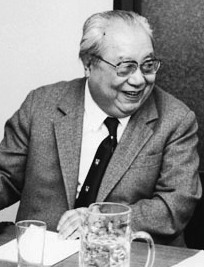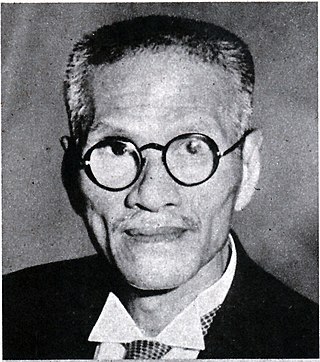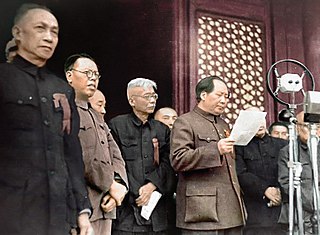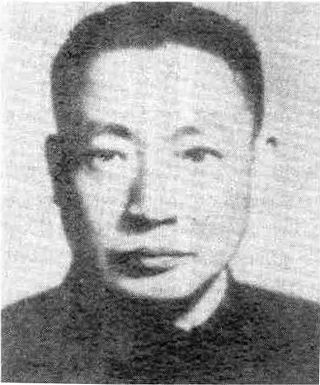Related Research Articles

Maoism, officially Mao Zedong Thought, is a variety of Marxism–Leninism that Mao Zedong developed while trying to realize a socialist revolution in the agricultural, pre-industrial society of the Republic of China and later the People's Republic of China. A difference between Maoism and traditional Marxism–Leninism is that a united front of progressive forces in class society would lead the revolutionary vanguard in pre-industrial societies rather than communist revolutionaries alone. This theory, in which revolutionary praxis is primary and ideological orthodoxy is secondary, represents urban Marxism–Leninism adapted to pre-industrial China. Later theoreticians expanded on the idea that Mao had adapted Marxism–Leninism to Chinese conditions, arguing that he had in fact updated it fundamentally and that Maoism could be applied universally throughout the world. This ideology is often referred to as Marxism–Leninism–Maoism to distinguish it from the original ideas of Mao.

Fei Xiaotong or Fei Hsiao-tung was a Chinese anthropologist and sociologist. He was a pioneering researcher and professor of sociology and anthropology; he was also noted for his studies in the study of China's ethnic groups as well as a social activist. Starting in the late 1930s, he and his colleagues established Chinese sociology and his works were instrumental in laying a foundation for the development of sociological and anthropological studies in China, as well as in introducing social and cultural phenomena of China to the international community. His last post before his death in 2005 was as Professor of Sociology at Peking University.

Wu Han was a Chinese historian and politician. Wu was one of the most important historians in the development of modern historical scholarship in China during the 1930s and 1940s.
Nagalingam Shanmugathasan was a trade unionist and Maoist revolutionary leader in Sri Lanka. He was the General Secretary of the Ceylon Communist Party (Maoist)

Jiang Menglin, also known as Chiang Monlin, was a Chinese educator, writer, and politician. Between 1919 and 1927, he also served as the President of Peking University. He later became the president of National Chekiang University. In the early 1950s, he was head of the Joint Commission on Rural Reconstruction in Taiwan.

Wang Kemin was a leading official in the Chinese republican movement and early Beiyang government, later noted for his role as in the collaborationist Provisional Government of the Republic of China and Wang Jingwei regime during World War II.
Yu Pingbo, original name Yu Mingheng (俞銘衡) and courtesy name Pingbo (平伯), was a Chinese essayist, poet, historian, redologist, and literary critic.
On Protracted War is a work comprising a series of speeches by Mao Zedong given from May 26, 1938, to June 3, 1938, at the Yenan Association for the Study of the War of Resistance Against Japan. In it, he calls for a protracted people's war, as a means for small revolutionary groups to fight the power of the state.

Jiang Kanghu, who preferred to be known in English as Kiang Kang-hu,, was a politician and activist in the Republic of China. His former name was "Shaoquan" (紹銓) and he also wrote under the name "Hsü An-ch'eng" (許安誠).

Zhang Shizhao, courtesy name Xingyan, pen name Huangzhonghuang, Qingtong or Qiutong, was a Chinese journalist, educator, politician of the early 20th century known for his advocacy first of revolutionary cultural values in the period leading up to the 1911 Revolution and then of traditional Confucian culture in following years.

Sun Baoqi was a government official, foreign minister, and premier of the Republic of China. His courtesy name was Mu-han (慕韓)

Sun–Joffe Manifesto or the Joint Manifesto of Sun and Joffe (孫文越飛宣言) was an agreement signed between Sun Yat-sen and Adolph Joffe on January 26, 1923, for the cooperation of Republic of China's Kuomintang and Soviet Union. The manifesto asserted that the Soviet system was not suitable for China and announced in general terms the willingness of Soviet to co-operate with the KMT in its struggle to unify China.

Political power grows out of the barrel of a gun is a phrase which was coined by Chinese communist leader Mao Zedong. The phrase was originally used by Mao during an emergency meeting of the Chinese Communist Party (CCP) on 7 August 1927, at the beginning of the Chinese Civil War.
Ying Lianzhi, also known as Ying Hua, was a Manchu Bannerman, a prominent Catholic layman who agitated for church reform, founder of the prominent newspaper Ta Kung Pao, and instrumental in founding The Catholic University of Peking.

Stuart Reynolds Schram was an American physicist, political scientist and sinologist who specialised in the study of modern Chinese politics. He was particularly well known for his works on the life and thought of Mao Zedong.

Tsai Ting Kan was a Chinese naval officer. Tsai was educated in the United States as a student on the Chinese Educational Mission and became an admiral in the Qing dynasty navy and Republican era statesman and politician.

Mao Renfeng was a Republic of China general and spymaster who headed the Bureau of Investigation and Statistics from 1946 until his death, succeeding his childhood friend Dai Li, who died in a plane crash in 1946. Between 1946 and 1949, his spy agency played a prominent role in the Chinese Civil War. In 1949, he fled to Taiwan with the rest of the Nationalist government, where he died 7 years later.

The Selected Works of Mao Tse-Tung, is a five volume collection of the written works of Mao Zedong ranging from the years 1926–1957. The collection was first published by the People's Publishing House in 1951, and was later translated into English by the state-owned Foreign Languages Press. A fifth volume, which included the works of Chairman Mao from 1949 to 1957, was released during the leadership of Hua Guofeng, but subsequently withdrawn from circulation for its perceived ideological errors. There has never been an official "Complete Works of Mao Zedong" collecting all his known publications. A number of unauthorized volumes of the Selected Works of Mao Tse-Tung have been released, such as Volumes 6–9 which were published in India by the Communist Party of India (Maoist).
Biographical Dictionary of Republican China is a biographical dictionary in four-volumes, often abbreviated as BDRC or referred to as "Boorman". It was published from 1967 to 1971 by Columbia University Press, edited by Howard L. Boorman, Director of the Research Project on Men and Politics in Modern China at Columbia University, with Richard C. Howard and O. Edmund Clubb. It includes 600 biographical articles written by some seventy-five contributors on men and women prominent in China's Republican period (1911-1949). Their careers are followed beyond 1949, some until 1966. More than half of the subjects are in politics, military, diplomacy or administration; a little more than a quarter intellectuals, such as scholars, journalists, propagandists; 10.8% in the arts; 7% in professions such as doctors, jurists, and clergy; and only 6.2% in business.

Ye Dehui was a Chinese writer and editor active during the Qing dynasty and the Republican Era. Vacillating between academia, business, and civil service in his early life, Ye eventually established himself as a leading bibliophile and literatus. He was executed by the local government for his alleged counter-revolutionism.
References
- Henriot, Christian (25 January 2021), "The Boorman Factory", PEERS
- Henriot, Christian (20 December 2020), "X-Boorman: a digital revival", PEERS, doi:10.58079/o8lk
- Special Collections and Archives, Biographical Note: Howard L. Boorman Papers, University of Colorado